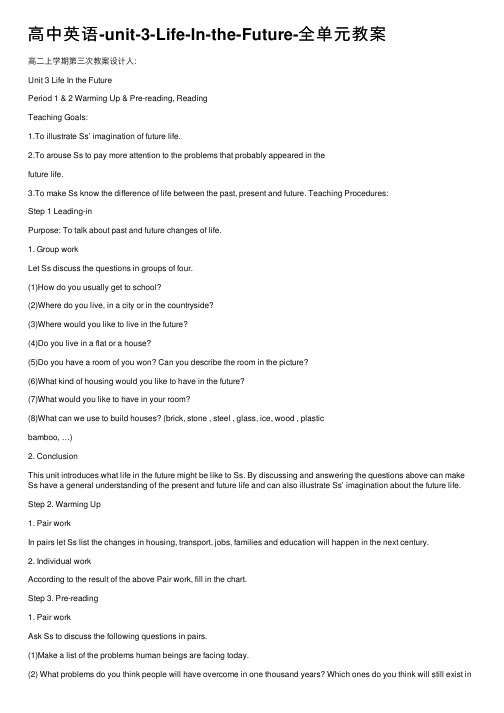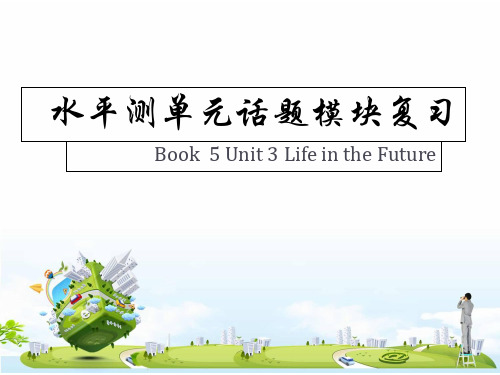人教版高中英语必修五Unit3 life in the future
- 格式:ppt
- 大小:1.50 MB
- 文档页数:26

Unit 3Life in the futureWarming Up & ReadingⅠ单词拼写1.We hired a local g to show us around the old city.2.The special robot in that film left a deep i on us.3.She was always o, even when things were at their worst.4.A lot of people in China starved to death for l of food in 1942.5.I can’t t so much noise when I’m doing my homework.6.Sometimes we can solve our problems according to our (先前的) experience.7.The weather is a (时常发生的) topic of conversation in Britain.8.There was no one at the reception desk, so he (按,压) a bell for service.9.It’s clear that the twins are quite different in many (方面).10.The villagers decided to search the (周围的) areas for the missing boy.Ⅱ短语填空1.Playing games on the Internet (占用) most of his time last term.2.He (溜进) the room to look for an old watch that night.3.He didn’t leave the platform until he (看不见) her.4.Our classroom should be(打扫) after class every day.5.He(加快速度) the car in order not to be late for the meeting.6.(缺乏) sleep will severely influence the work in the daytime.7.We are informed that David has (康复) already.8.(结果), some areas of the world will become highly polluted.9.The film will (给……留下深刻印象) everybody who sees it.10.As soon as the man got home, he sat down and (打开) the TV. Ⅲ句型训练1.他在风雪中度过了7天,又冷又饿。


⾼中英语-unit-3-Life-In-the-Future-全单元教案⾼⼆上学期第三次教案设计⼈:Unit 3 Life In the FuturePeriod 1 & 2 Warming Up & Pre-reading, ReadingTeaching Goals:1.To illustrate Ss’ imagination of future life.2.To arouse Ss to pay more attention to the problems that probably appeared in thefuture life.3.To make Ss know the difference of life between the past, present and future. Teaching Procedures:Step 1 Leading-inPurpose: To talk about past and future changes of life.1. Group workLet Ss discuss the questions in groups of four.(1)How do you usually get to school?(2)Where do you live, in a city or in the countryside?(3)Where would you like to live in the future?(4)Do you live in a flat or a house?(5)Do you have a room of you won? Can you describe the room in the picture?(6)What kind of housing would you like to have in the future?(7)What would you like to have in your room?(8)What can we use to build houses? (brick, stone , steel , glass, ice, wood , plasticbamboo, …)2. ConclusionThis unit introduces what life in the future might be like to Ss. By discussing and answering the questions above can make Ss have a general understanding of the present and future life and can also illustrate Ss’ imagination about the future life. Step 2. Warming Up1. Pair workIn pairs let Ss list the changes in housing, transport, jobs, families and education will happen in the next century.2. Individual workAccording to the result of the above Pair work, fill in the chart.Step 3. Pre-reading1. Pair workAsk Ss to discuss the following questions in pairs.(1)Make a list of the problems human beings are facing today.(2) What problems do you think people will have overcome in one thousand years? Which ones do you think will still exist inAD 3008?Suggested Answers:①The first problem I would like to point out is the decline of morality.(道德沦丧)②The second problem is the racial bias problem. (种族歧视)③The third problem , which is a most serious problem , is the rapid depletion of resources on the Earth. (资源匮乏)④Now I come to the fourth problem, the problem of the large gap between the poor and the rich . (贫富悬殊)⑤The fifth problem is the pollution problem.(环境恶化)⑥Now I would like to talk about the sixth problem, the expensive arms race problem. (军备竞争)。


![人教版高中英语【必修五】[知识点整理及重点题型梳理] Unit 3 Life in the future语言点](https://img.taocdn.com/s1/m/c5c52992dd3383c4bb4cd2e1.png)
人教版高中英语必修五知识点梳理重点题型(常考知识点)巩固练习Unit 3 Life in the future语言点学习目标重点词汇aspect, impression, remind, constantly,previous, uncertain, guide, surroundings, lack, optimistic, settlement, 小词简析重点短语take up, be back on one’s feet, lose sight of, sweep up, slide into, speed up重点句型1. as though/ as从句2. 疑问词+do you think +其余部分?3. Is it likely/ unlikely that...?4. Suppose that...知识讲解重点词汇aspect【原句回放】Below are some of the main aspects of life today. 以下是现代生活的几个主要方面。
【点拨】aspect n.方面;方位,朝向;样子,外观I feel we should look at the problem from every aspect.我感觉我们应该从各方面来考虑这个问题。
Would you give some advice to us on the health and safety aspects of our products?你能就我们的产品的健康和安全方面给我一些建议吗?Our room has a western aspect. 我们的房间朝西。
Her face wore an angry aspect. 她面带怒容。
impression【原句回放】First Impressions 第一印象【点拨】impression n.印象,印痕常用搭配:create/ give/ make a ... impression (on sb.) (给某人)留下......的印象have/ get the impression that... 有......的印象be under the impression that 原以为The dirty and seedy aspect of the bar created a bad impression on us.酒吧肮脏、破旧的外观留给我们很坏的印象。
Unit 3 Life in the future (知识点剖析)(一)单词·巧记·典句·考点1. vehicle[v'i:ikl]n.交通工具;车辆【巧记提示】词根vect,“传送;运载”。
【经典例句】The street is dominated by car vehicles.街道上满是车辆。
【考点聚焦】1)vehicle 特指陆地上的交通工具。
2)vehicle还可以指“(思想、情报的)传达手段、媒介”,如:This radio station has become a vehicle for conservative opinion.这家电台已成为保守派意见的传播管道。
3)常见同义词有conveyance n.运输;财产让与;运输工具;carriage n.四轮马车;客车2. private[p'rivit] adj.私人的;私有的【巧记提示】priv(单独;个别;私下)+-ate(具有或显示某性质)。
【经典例句】This is private parking lot, you cannot park here.这是私人的停车点,你不能在这里停车。
【考点聚焦】1)固定搭配:in private 秘密的;不公开的;私下的反义词:in public 公开的;公众的2)同根词:privacy n.私生活;隐私如:Telling that on TV was invasion of her privacy.在电视上谈论那件事侵犯了她的隐私权。
']n.印象;感想;印记3. impression[im pre【巧记提示】im(置于某状态或条件中;向内)+press(给……以压力)+ion(表示行为;行为的状态或结果)【经典例句】His speech made quite an impression on the audience.他的演说给听众留下了相当好的印象。
Unit 3 Life in the futureⅢ. 教材分析与教材重组1. 教材分析本单元以“Life in the future”为中心话题,旨在通过本单元的学习,让学生大胆发挥想象,对人类今后的生活环境,生活方式进行猜测,并在此基础上,对人类的种种活动进行反思,提倡环保生活意识。
同时让学生学会过去分词作定语和作状语的不同用法。
最后让学生将本单元所讨论的话题和推测手法相结合,学习怎样写report。
1.1 Warming Up 部分利用一个关于“住”和“行”的对比研究表格引导学生回顾过去,认识现在和展望未来。
通过这一活动,引发学生对过去,现在和未来的思考,使学生对将要阅读的文章有个知识准备。
1.2 Pre-reading 部分让学生充分运用发散思维,先列举当今世界人类面临的一些突出问题,然后要求学生思考为什么会产生这些问题,这些问题中哪些在未来社会仍然可能存在,哪些将会被克服,哪些将会恶化。
为下面的阅读做了铺垫。
1.3 Reading 部分通过一封发自未来的电子邮件,讲述了作者Li Qiang怎样安全到达“未来世界”,他对“未来世界”的印象,以及“未来世界”的日常生活方式和交通工具情况。
阅读时要把重点放在“未来世界”生活与当今生活的不同点上。
1.4 Comprehending 部分设计了三个教学活动来加深学生对Reading部分的理解。
第一个活动要求学生通过阅读找出“未来世界”在以下几个方面的变化:跨时空旅行,交通,住房,城镇环境和空气质量。
接着让学生在此基础上得出自己的结论,哪些变化好,哪些变化不好,并说明理由。
第二个活动要求学生通过阅读来判断Li Qiang对“未来世界”的态度是乐观的还是悲观的。
学生要在文中找出支持自己观点的论据,尽可能说服别人。
第三个活动让学生想象一下Li Qiang 将会去参加哪些活动。
这样既鼓励学生展开丰富的想象,又为Using Language 部分的语篇学习做了铺垫。